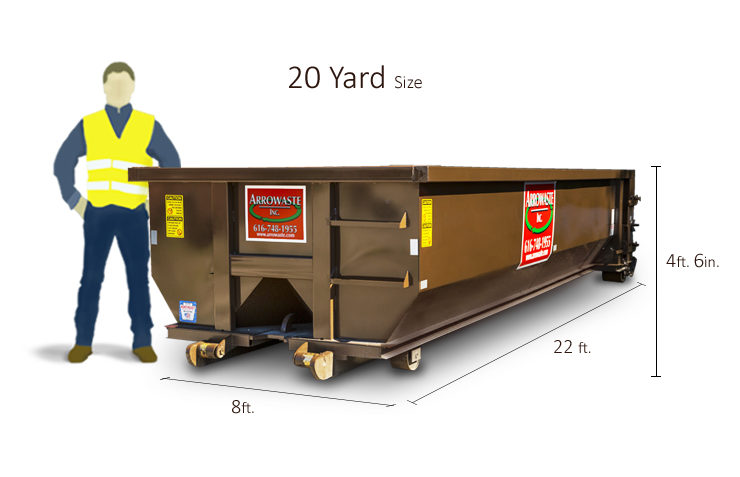To accomplish dumpster rental success, adhere to these 10 straightforward steps: identify job waste requires, pick the right dumpster size, set a clear rental period, check local regulations, prepare the site for distribution, take care of hefty particles properly, keep the dumpster tidy, timetable pick-up on schedule, evaluation rental terms thoroughly, and warranty conformity with regional laws. By following these actions, you'll avoid pricey mistakes, ensure a seamless job timeline, and preserve a tidy and secure worksite. By understanding these necessary steps, you'll be well on your method to a successful dumpster rental experience that establishes your project up for success.
Determine Job Waste Needs
Accurately evaluating waste generation is necessary to a successful dumpster rental experience Understanding the volume and kind of waste your project will produce aids you prepare for effective waste management
Start by determining the project scope, including the products involved, and estimate the amount of waste that will be created. Consider variables such as demolition, construction, or improvement tasks, along with the type of materials being used or removed.
Next, examine the task timeline to determine the duration of waste generation. This will help you prepare for the needed dumpster rental duration and avoid unnecessary extensions or early pick-up fees.

Additionally, think about any type of local regulations or constraints on garbage disposal to ensure conformity. By accurately examining your project's waste needs, you can make certain a seamless dumpster rental experience, lessen costs, and preserve a clean and organized worksite
Choose Right Dumpster Size
Selecting the suitable dumpster dimension is vital to an effective waste monitoring technique. A dumpster that is too tiny can bring about overflow, resulting in additional costs and trouble. On the various other hand, a dumpster that is also huge can be a waste of sources and space.
To select the best dumpster dimension, think about the list below factors:
Volume of waste: Quote the amount of waste you expect to produce during your job. This will aid you figure out the dumpster size required to suit your waste needs.
Type of waste: Different sorts of waste, such as building particles or family trash, have various quantity and weight needs. Make certain you pick a dumpster dimension that can deal with the certain sort of waste you will be getting rid of of.
Space constraints: Take into consideration the room available for the dumpster on your job site. Ensure the dumpster dimension you select fits comfortably in the marked area, permitting very easy gain access to and maneuverability.
Set Clear Rental Period
A distinct rental period is the cornerstone of a hassle-free dumpster rental experience, ensuring that your job timeline and waste management needs are sympathetically aligned.
By developing a clear rental period, you can avoid unnecessary delays, extra fees, and aggravation. When establishing your rental duration, think about the scope of your job, the quantity of waste you expect to generate, and the logistics of your clean-up schedule.
Be reasonable concerning the length of time you'll need the dumpster, and factor in some added time for unexpected setbacks A normal rental duration arrays from a few days to numerous weeks, relying on the type of job and the dumpster size.
Be certain to review your rental duration with your dumpster rental service provider to verify you're both on the same web page. By doing so, you'll prevent misconceptions and guarantee a seamless waste monitoring experience that meets your requirements and stays within your budget.
Check Local Laws First
Your job's waste monitoring method rests on compliance with regional guidelines, which can vary considerably depending on your place and the sort of job you're undertaking.
Failure to conform can lead to fines, charges, and even job hold-ups. To prevent these concerns, it's vital to research and recognize the regional laws regulating dumpster leasing and waste disposal in your area.
Here are 3 crucial locations to focus on:

Permit requirements: Establish if you need any special authorizations to put a dumpster on your property or on the street. Some municipalities call for permits for dumpster placement, while others may have specific guidelines for certain types of projects.
Waste disposal restrictions: Discover what kinds of waste are banned from being gotten rid of in a dumpster, such as harmful materials or electronic devices. Validate you comprehend what can and can not be put in the dumpster.
Dumpster positioning and dimension restrictions: Inspect if there are any type of constraints on the dimension or positioning of dumpsters in your location, consisting of any type of problems from residential or commercial property lines or streets.
Prepare Website For Delivery
Site prep work is important for a seamless dumpster rental experience, assuring a hassle-free shipment and efficient waste administration process.
A well-prepared website enables the dumpster to be positioned properly, reducing the threat of damage to home or surrounding structures
Begin by getting rid of the assigned location of any type of barriers, such as lorries, furnishings, or debris. Determine the surface is degree and company, as irregular or soft ground can trigger the dumpster to change or end up being unstable.
If the dumpster will be positioned on a driveway or street, obtain any necessary permits or approvals.
Additionally, designate a clear path for the delivery van to access the website, considering any kind of overhead obstructions like high-voltage line or tree branches.

Load Dumpster Securely Always
Proper loading techniques are necessary to maintaining a successful dumpster rental experience, as they straight impact the efficiency and safety of the waste administration process. A well-loaded dumpster warranties that waste is carried effectively, reducing the danger of mishaps and ecological hazards.
Additionally, it additionally aids prevent damages to the dumpster and surrounding property.
To lots a dumpster safely, comply with these standards:
Distribute weight evenly: Make sure that the weight of the waste is equally dispersed throughout the dumpster to stop it from ending up being top-heavy or unstable. Load heavier things at the bottom: Area heavier products, such as furniture or devices, at the bottom of the dumpster to create a steady base. Keep the dumpster covered: Cover the dumpster with a tarp or various other material to prevent particles from spilling out throughout transportation.Manage Heavy Debris Properly
Heavy debris, such as construction materials and large things, can position significant challenges throughout the dumpster rental process These products can be hard to manage because of their dimension, weight, and volume, making it vital to prepare in advance and take needed precautions.
To warranty a smooth and effective dumpster rental experience, it is important to handle heavy debris properly. Beginning by separating hefty particles from lighter materials to stop damage to the dumpster and bordering building. This partition will certainly likewise assist you to maximize the dumpster's ability, reducing the demand for multiple rentals.
When filling hefty debris, distribute the weight evenly and stay clear of straining the dumpster to stop crashes and spills. Additionally, think about the dumpster's weight capacity and select a rental solution that provides dumpsters ideal for managing heavy debris.
Keep It Tidy Inside Out
Effective monitoring of heavy particles establishes the phase for a successful dumpster rental experience. A https://piedmonttriaddumpsters.com/dumpster-rental-hillsborough-nc/ clean and organized dumpster not just ensures a smooth rental procedure yet additionally aids keep a secure and healthy and balanced environment for every person involved.
Keeping the dumpster clean completely is important to prevent any potential concerns during the rental period.
To attain this, comply with these easy steps:
Regularly clean the dumpster interior to avoid the accumulation of particles and odors. Verify proper segregation of waste to stay clear of contamination and facilitate effective disposal. Keep the surrounding area clean and clear to stop particles from spreading and to permit easy accessibility to the dumpster.Schedule Pick-up On Time
Scheduling dumpster pickup in a timely manner is crucial to a smooth rental experience, as it ensures that the dumpster is removed without delay, and the website is restored to its initial state.
This verifies that your residential or commercial property continues to be clean and organized, and you can focus on various other crucial tasks. When organizing pick-up, be sure to supply the rental business with a specific day and time that benefits you.
This will certainly aid avoid any delays or miscommunications that can lead to extended leasing periods or extra costs. Furthermore, see to it to have the dumpster ready for pick-up by ensuring it is easily obtainable and not blocked by any obstacles.
By doing so, you can relax confident that the dumpster will certainly be gotten rid of efficiently, and you can appreciate a problem-free rental experience.
Review Rental Terms Carefully
Every dumpster rental arrangement includes a set of terms that detail the responsibilities of both the tenant and the rental company.
It is essential to very carefully evaluate these terms to guarantee a smooth and worry-free rental experience.
Before authorizing the arrangement, take the time to review the conditions. This will assist you comprehend what is anticipated of you and the rental company.
Here are three essential points to look for:
Rental Period: Know the precise period of the rental duration and the repercussions of keeping the dumpster longer than agreed upon.
Weight and Dimension Restrictions: Recognize the weight and dimension constraints of the dumpster to stay clear of extra fees or penalties.
Disposal Guidelines: Acquaint yourself with the standards for disposing of different sorts of waste to guarantee compliance with regional guidelines and avoid fines.